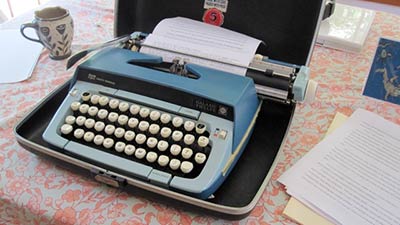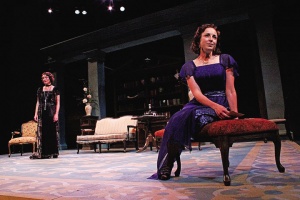
A few months ago I told my friend R. that I’d thrown out the novel I’d been working on for the past few years after realizing that it was hopelessly botched and started something new. A few days later he left this typewriter, a manual Smith-Corona, on my porch as a loan. Truth to tell, while I appreciated the gesture, the typewriter remained in its case until the other week when I got it out for some note-taking. I liked it, invested in a fresh ribbon, and now it’s my new “orgasm pen.”
The two main things I like about the typewriter: You have to move forward — no endless revision with the delete key — and it’s not connected to the Internet. Also, the dog thumps her tail every time the carriage returns even when she’s mid-nap.
Related: Maud recently uncovered this trove of BBC author interviews . There are lots of amazing ones, but my favorite so far is Daphne Du Maurier’s as it opens on her at her typewriter, which would be the standard “the author at work” establishing shot except for DuMaurier’s super-strong finger-punching technique on the keys.
Archives for September 3, 2010
TT: Not so good for the geese
In the second of two reports from Wisconsin’s American Players Theatre, I review a major revival of Somerset Maugham’s rarely seen The Circle in this morning’s Wall Street Journal. Here’s an excerpt.
* * *
 Long before he became one of the world’s most popular novelists, Somerset Maugham was one of England’s most successful playwrights. Four of his new plays actually ran simultaneously in London’s West End in 1908, an achievement that makes Neil Simon look like a piker. But Maugham’s brand of high social comedy had fallen from grace long before his death in 1965. It’s been 21 years since any of his plays was successfully mounted on Broadway, and that one, “The Circle,” presumably owed its success to the presence in the cast of Rex Harrison. While Maugham revivals are not unknown in this country, one almost always has to get out of New York to see them. So I hastened to Wisconsin’s American Players Theatre, one of America’s top classical companies, to find out how well “The Circle,” which was first performed in London in 1921, has held up, and the answer–to my surprise–is that it is not merely viable but brilliant.
Long before he became one of the world’s most popular novelists, Somerset Maugham was one of England’s most successful playwrights. Four of his new plays actually ran simultaneously in London’s West End in 1908, an achievement that makes Neil Simon look like a piker. But Maugham’s brand of high social comedy had fallen from grace long before his death in 1965. It’s been 21 years since any of his plays was successfully mounted on Broadway, and that one, “The Circle,” presumably owed its success to the presence in the cast of Rex Harrison. While Maugham revivals are not unknown in this country, one almost always has to get out of New York to see them. So I hastened to Wisconsin’s American Players Theatre, one of America’s top classical companies, to find out how well “The Circle,” which was first performed in London in 1921, has held up, and the answer–to my surprise–is that it is not merely viable but brilliant.
Most of Maugham’s other plays, to be sure, are period pieces that merit the dusty obscurity into which they long ago fell, but “The Circle” is different. Instead of the not-quite-Wilde-enough epigrams of “The Constant Wife,” we get a drawing room full of well-dressed but plain-spoken characters who might have stepped out of one of Maugham’s own short stories, plus a plot so soundly made that you’ll be engrossed as soon as the wheels start turning.
Lady Kitty (Tracy Michelle Arnold), the fallen woman at the center of “The Circle,” walked out on Clive (Brian Mani), her husband, 30 years ago and ran off to Italy with Lord Porteous (James Ridge), Clive’s best friend. Now Kitty and her aging consort have returned to England for the first time to pay a call on Arnold (Paul Hurley), her son, who was five years old when she bolted and is now a promising but priggish young politician who recoils at the thought of further scandal. Little does Arnold know that Elizabeth (Susan Shunk), his wife, has fallen for another man and is thinking of doing as Lady Kitty did…
James Bohnen, the departing artistic director of Chicago’s Remy Bumppo Theatre Company, a troupe whose work I greatly admire, has caught the tone of “The Circle” with perfect exactitude, and his cast, which consists for the most part of old APT hands, is with him all the way. Ms. Shunk, who is so fine as Birdie in this season’ revival of Lillian Hellman’s “Another Part of the Forest,” is, if anything, even more appealing as Elizabeth. At first her naïvete seems a bit much–you want to kick some sense into her–but before long you’ll find yourself hoping against hope that she’ll refuse to settle for the respectable life of a politician’s wife….
* * *
Read the whole thing here.
TT: Please omit music (or else)
You may possibly have read about the latest pronunciamento from Iran’s Ayatollah Ali Khamenei, who informed his unhappy people the other day that the promoting and teaching of music is “not compatible with the highest values of the sacred regime of the Islamic Republic.” Would that this was a sick joke, but it’s not, nor is it the first time that an Islamic leader has declared war on music in recent years.
Such craziness should always, of course, be drawn to the attention of innocents who ought to know better but usually don’t, so I’ve made it the subject of my “Sightings” column in Saturday’s Wall Street Journal. Not wanting to settle for merely shooting fish in a barrel, though, I also discuss the equivocal relationship between Western Christianity and music. Read all about it in tomorrow’s Journal, but for now suffice it to say that the West has a fair amount of splainin’ of its own to do….
UPDATE: Read the whole thing here.
TT: Almanac
“He was fond of the theatre, but aware that there were people who would consider his tastes old-fashioned, even barbarous. He liked a play to have a beginning and a middle and an end; he liked to spot the crises, to recognize a craftsman at his business of constructing craftily; he liked a firm ending, to leave the theatre with that tiny scar on consciousness which meant he had been moved. He knew that there were people who talked crossly about commercial theatre and the well-made play; he knew their opinions but he did not care for them.”
William Haggard, Closed Circuit
